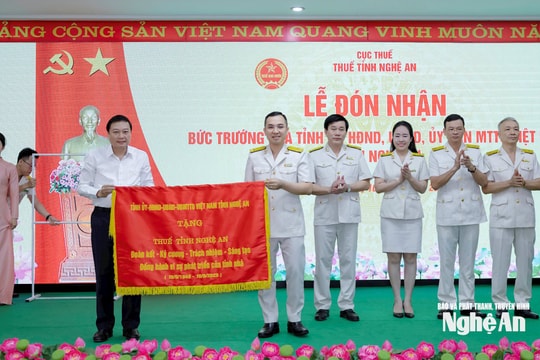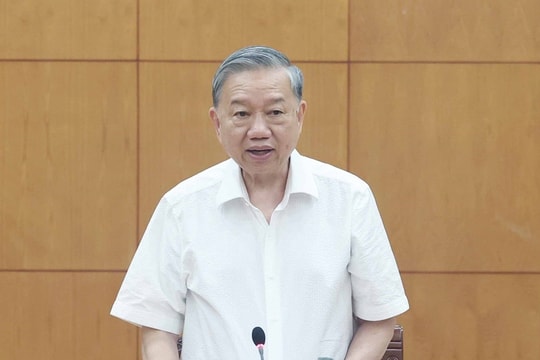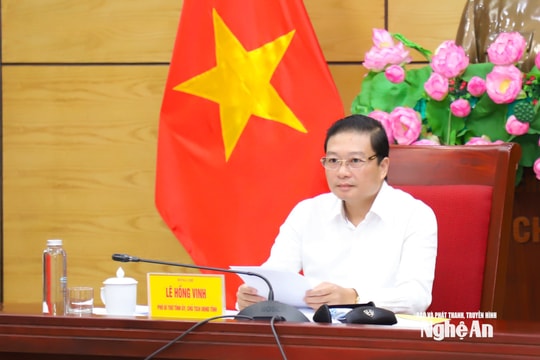Nghe An: 74% of agricultural cooperatives change operations
(Baonghean) - The project to convert agricultural cooperatives (AHCs) operating under the 2012 Law on Cooperatives was planned by the Provincial People's Committee and assigned specifically to provincial departments, branches, and sectors, and People's Committees of districts, cities, and towns. However, after nearly 3 years of implementation, the progress has not met the set requirements, the rate of reorganized cooperatives only reaching 73.9% of the total number of agricultural cooperatives in the province.
Transforming the model to survive
By September 30, 2016, the whole province had 321/434 agricultural cooperatives that had reorganized their operations according to the 2012 Cooperative Law; 22 newly established cooperatives, 60 cooperatives that were operating but had not yet been converted according to the 2012 Cooperative Law; 55 cooperatives had been and were in the process of being dissolved.
Of these, 25 cooperatives merged into 10 cooperatives; 11 cooperatives reviewed and evaluated their operations and converted to other types; and 18 weak cooperatives were dissolved. The remaining 113 agricultural cooperatives had to complete the review to re-register, merge, consolidate or dissolve according to the 2012 Law on Cooperatives.
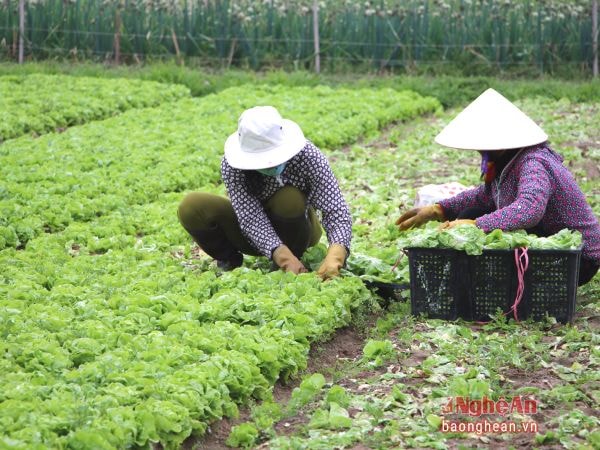 |
| Members of Phu Luong Cooperative (Quynh Luu) produce commercial vegetables. |
Although there are still certain limitations, in the process of implementing the transformation of agricultural cooperatives in localities, there have appeared units that actively directed and mobilized the entire political system in the district to participate and support cooperatives to reorganize their activities.
A typical example is Hung Nguyen district, which established a Steering Committee with the Secretary of the District Party Committee as the head, the Deputy Secretary of the District Party Committee and the Chairman of the District People's Committee as the deputy heads, and has a support policy for cooperatives to reorganize their operations according to the Cooperative Law 2012 of 20 million VND/cooperative. However, by the end of September 2016, the whole district had only converted 8/26 agricultural cooperatives.
Some districts such as Quynh Luu, Dien Chau, Yen Thanh, Do Luong... have focused on directing communes to have policies to support cooperatives to reorganize their operations, so the results have been quite high. The implementation of converting agricultural cooperatives to operate under the Cooperative Law 2012 has consolidated and assessed the current state of collective economy in the province's agriculture. Putting cooperatives into a framework, operating in accordance with the law; resolving the number of cooperatives operating inefficiently, with long-term losses. Cooperatives that are disguised enterprises have been converted to other types of legal organizations. The consolidation and merger of many cooperatives to expand the scale, increase the efficiency of service business...
Vinh City has a large number of cooperatives with 54 units, more than 21,540 members, of which 25 are agricultural cooperatives. Currently, 36 cooperatives have organized activities according to the Law on Cooperatives 2012. In recent years, the city has paid attention to and created favorable conditions to support in all aspects to promote the development of the cooperative economic sector. Specifically, it has established a Fund to support the development of cooperatives and policies to promote industry and agriculture; organized training on skills to build production and business plans, accounting skills, and training on the Law on Cooperatives 2012... In the period of 2011 - 2015, 13 projects of cooperatives were considered for loans with a turnover of 7,350 million VND. The capital borrowed from the city's Fund to support the development of cooperatives has actively supported cooperatives to invest in developing production and business effectively.
To achieve the above clear changes, according to Mr. Tran Quang Lam - Head of Vinh City Economic Department, the consolidation and innovation of cooperative development must first meet the practical interests of members; avoid neglecting and loosening the direction of Party committees and State management of the government. Pay attention to training and attracting human resources for cooperatives. Cooperatives that want to develop need a team of capable managers, trained and long-term commitment to the cooperative...
However, the conversion of operations under the 2012 Cooperative Law in the area still has some cooperatives facing difficulties and confusion in planning effective production and business plans. Therefore, to continue promoting the development of the collective economic sector in the period of 2016 - 2020, the City People's Committee focuses on measures to remove difficulties and create conditions for cooperatives to consolidate their operations in accordance with the nature of the 2012 Cooperative Law. At the same time, attention is paid to training and improving the management capacity of the cooperative management apparatus as well as the State management apparatus on collective economy...
Need a synchronous solution
In Yen Thanh district, by September 22, 2016, 33 cooperatives were newly established and converted to operate under the 2012 Cooperative Law. 10 cooperatives have ceased operations for many years and now have plans to establish new ones. To accelerate the progress of converting agricultural cooperatives, the district has issued appropriate mechanisms and policies, creating motivation for cooperatives to actively convert according to the new law. Each cooperative that converts is supported by the district with funding for organizing congresses, training, information, application of scientific and technical advances, joint ventures in production, product consumption for farmers, and support for factory construction.
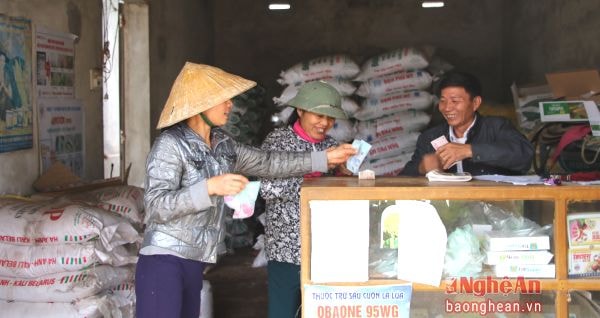 |
| Thuong Son Agricultural Cooperative (Do Luong) supplies fertilizers to local people. |
In Hung Nguyen district, in addition to the 20 million VND reward for each cooperative that successfully converted, the agricultural and financial departments also support the cooperative in making production and business plans. In addition, any cooperative that needs support in investing in mechanization programs and safe clean vegetable production programs will receive support from the district's annual economic development budget, the level of support depending on the investment scale of the cooperative. Particularly for irrigation projects for the beach area, support is 300 million VND/project.
Mr. Hoang Duc An - Head of the Department of Agriculture of Hung Nguyen district said: Despite many efforts, the conversion of agricultural cooperatives in Hung Nguyen has encountered many difficulties in recent times because the potential of most agricultural cooperatives is weak in all aspects, lacking capital, lacking production and business plans, and lacking competent staff. Meanwhile, most of the cooperative managers are old, lacking acumen and boldness in innovating and expanding business services. The most difficult thing is to find a suitable and feasible production and business plan, creating many jobs to serve the interests of members, while maintaining sustainable development of cooperatives.
Discussing the issue of converting agricultural cooperatives in the province, Mr. Nguyen Van Phuong - Head of the Department of Cooperative Economics and Household Economy - Department of Rural Development said: Many cooperatives have converted their operations according to the 2012 Cooperative Law, but have not yet operated in accordance with the nature of the Cooperative Law. Most of the current cooperatives do not serve the interests of their members, but serve the entire population, and have not distributed profits to members.
Agricultural cooperatives are mainly serving irrigation for the whole people, protecting the security of people's fields and collecting fees based on products and services; some profitable service production cooperatives have distributed profits to members according to capital contributions, but very little.
In the coming time, cooperatives that have reorganized their operations according to the 2012 Law on Cooperatives need to truly innovate in terms of content and methods of operation, strive to connect with businesses providing input and output services for members... to increase benefits for members as well as improve the operational efficiency of cooperatives.
Quynh Lan



